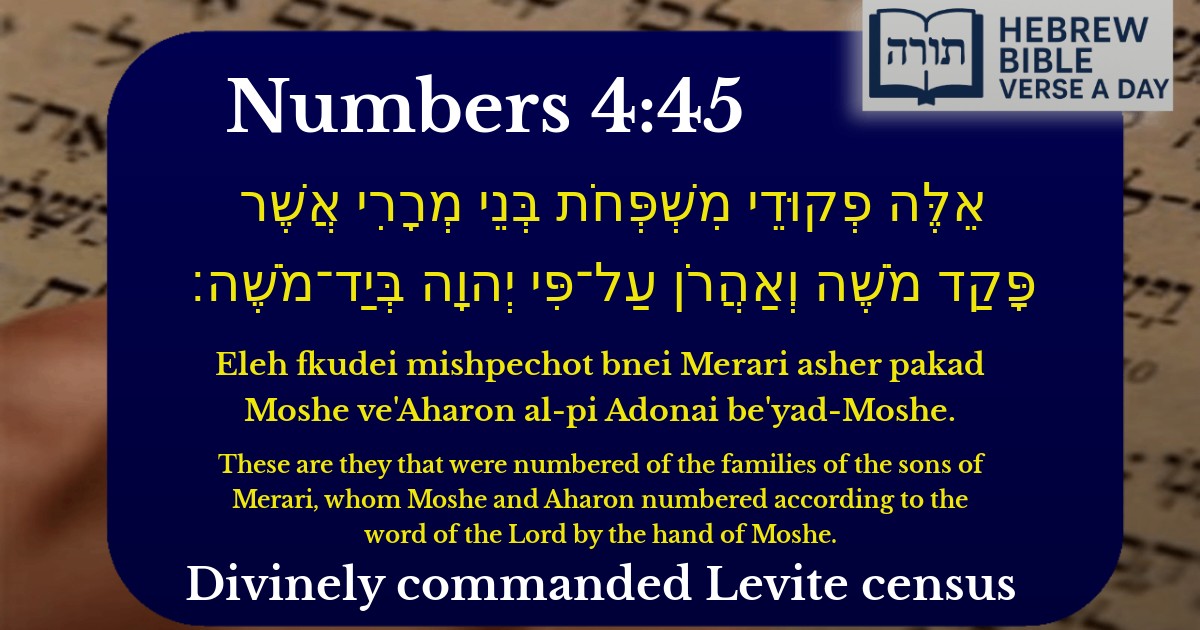Frequently Asked Questions
Q: What does Numbers 4:45 mean?
A: Numbers 4:45 describes the counting of the families of the sons of Merari, one of the Levite families, by Moshe and Aharon as commanded by Hashem. This was part of the census to assign specific duties in transporting and maintaining the Mishkan (Tabernacle). Rashi explains that this counting was done with precision and divine instruction to ensure proper service in the Mishkan.
Q: Why is the counting of the sons of Merari important?
A: The counting of the sons of Merari was important because each Levite family had unique responsibilities in the Mishkan. The Merarites were tasked with carrying the heavy structural components (boards, bars, pillars, etc.), as detailed in Numbers 3:36-37. Rambam (Hilchot Klei HaMikdash 3:6) emphasizes that every role in the Mishkan was essential for its sanctity and function.
Q: What can we learn from Numbers 4:45 about leadership?
A: This verse teaches that leadership involves following divine guidance ('al-pi Hashem'—'according to the word of the Lord') and delegating responsibilities with care. Moshe and Aharon didn’t count the Levites arbitrarily; they acted on Hashem’s command, showing that true leadership requires humility and obedience to a higher authority (Talmud, Berachot 55a).
Q: How does this verse apply to us today?
A: While we no longer have the Mishkan, the principle of assigned roles in sacred work still applies. Just as the Merarites had a specific duty, every Jew has a unique purpose in serving Hashem, whether through Torah study, prayer, or acts of kindness (Midrash Tanchuma, Nasso 16). The verse reminds us that every role in the community is valuable.
Q: Why does the verse mention 'by the hand of Moshe'?
A: The phrase 'by the hand of Moshe' emphasizes that the counting was carried out through Moshe’s authority as the leader appointed by Hashem. Rashi notes that this highlights Moshe’s role as the faithful messenger transmitting divine instructions accurately, a model for how Torah leaders must act with integrity and precision.


Context of the Verse
The verse (Bamidbar 4:45) is part of the census of the Levitical families, specifically detailing the counting of the sons of Merari, one of the three main branches of the tribe of Levi. This census was conducted under divine command to assign specific roles in transporting the Mishkan (Tabernacle).
Meaning of "Pekudei Mishpachot" (Numbering of the Families)
Rashi explains that the term "פְקוּדֵי" (pekudei) refers not merely to counting but to a careful accounting of each family's responsibilities. The sons of Merari were entrusted with carrying the structural components of the Mishkan—the beams, sockets, and pillars (Bamidbar 3:36-37). This was a sacred duty requiring precision, as emphasized by the phrase "עַל־פִּי יְהוָה" (according to the word of the Lord).
Role of Moshe and Aharon
The verse highlights that the census was conducted by Moshe and Aharon, underscoring its importance. Ramban notes that Aharon’s involvement was crucial because the Levites served under the Kohanim (priests), and their roles were interconnected with the service of the Mishkan. The phrase "בְּיַד־מֹשֶׁה" (by the hand of Moshe) further emphasizes that this was a direct commandment from Hashem, transmitted through Moshe as the leader.
Merari’s Significance in the Mishkan
The Midrash (Bamidbar Rabbah 6:11) elaborates that the sons of Merari, though assigned the heaviest parts of the Mishkan, performed their duties with joy. Their portion included the boards, bars, and sockets—essential for the Mishkan’s stability. This teaches that every role in avodat Hashem (divine service) is valuable, regardless of its perceived prestige.
Lessons for Leadership and Service